Just Use These 3 Easy Mechanics to Make Travel an Exciting Part of Your Campaign
By Riley Rath
Travel CAN be a great part of your Dungeons and Dragons sessions and campaign. But both rules-as-written and the ways it is run need to be A LOT better. In response, we began a series determined to cover everything necessary in making 5e travel as awesome as possible.
- Post #1 talks about why travel is important for adventures, the official dnd 5e travel rules, and why they suck (read about it here).
- Post #2 provides 7 popular methods for running DnD 5e overland travel, as well as tips for DMs (read it here).
Here is what this post (#3) is about: guidelines for creating the best D&D 5e travel gameplay. Together, they result in travel sessions everyone around the table will look forward to.
Table of Contents
- The Thing Travel Rules in DnD 5e Are Missing...
- Mechanic 1: Route(s) Q/A
- Mechanic 2: Roles
- Mechanic 3: Survival Meter
- Changes to Make These Rules DnD 5e Work
- Why These DnD 5e Travel Ideas Create GREAT Gameplay
The Thing Travel Rules in D&D 5e Are Missing...

As stated in the previous post (#2), there are (unless people bombard the comments with alternatives...) 7 methods a DM can use to travel, each perfect for certain situations and campaigns. But NONE of those solutions elevate 5e travel gameplay into something unique, exciting, or delightful. They are all missing something REALLY important... something that, in my opinion, keeps them from being "the best" option for traveling in Dungeons and Dragons... or any TTRPG for that matter.
So what are all of them missing? SURVIVAL.
Think about it... how many of your favorite adventures involve heroes traveling to distant lands? And how many of them have at least one "man vs nature" scene where they are struggling to survive?
Yeah... like... A LOT of our favorite stories meet those criteria. In fact, for some of the best adventure stories, survival is the ENTIRE adventure. In those stories, there is no need for some mustache-twirling BBEG or planet-ending conflict... struggling to survive is MORE THAN ENOUGH to capture our attention and imagination.
And yet THIS is the very thing that is skipped by D&D tables everywhere!!!
That is because going on an "unexpected journey" exposes you to danger. When far away from home, you are—at a minimum—outside your comfort zone, routine, and resources. So when danger comes and you are away from your cozy, well-equipped abode (say, a hobbit hole?)... the potential for dire consequences is amplified; one slight misstep and you are DONE FOR. And that danger puts you on the edge of your seat... turning an excursion into an ADVENTURE.
Survival is a BIG concern when our DND player characters are walking along the kings road or wandering the wilds. So many things could go wrong. They could:
- Take the wrong route...
- Get lost...
- Get caught in a storm...
- Be ambushed by thieves...
- Run out of money...
- Fall on bad luck... (etc.)
The Angry GM (my TOP resource for any serious Dungeon Master) goes to great lengths to make this point and does it so well I'm just gunna quote him: "People (in DnD) don't travel far because travel is dangerous... The thing is, the world is supposed to be dangerous. Traveling between sites is supposed to be daunting."
Now, doesn't that sound like a lot more FUN that just skipping travel or having a random encounter?!?!
So you know something's WRONG with your travel rules DnD 5e when your players think traveling is "NBD":
- Their characters should NOT be as comfortable camping out under the stars as they are in their warm bed...
- They would NEVER embark on a journey without carefully considering the great costs/risks...
- They would ALWAYS prefer to rest for several days after travel, rather than running straight into the dragon's lair...
But while incorporating survival into our travel rules DnD 5e is necessary, these are still primarily Dnd travel rules... not survival rules. And a survival mechanic isn't enough... these homebrew travel rules DnD 5e require two more special mechanics.
But when combined? They make DnD 5e traveling more than the sum of its parts...
Mechanic 1: Route(s) Q/A

Unless you are teleporting, to travel means to follow some sort of path/way/road... a route. And what separates "fantasy story/video game travel" from these travel rules DnD 5e is giving the players different routes/paths to choose from: options to get from point A to point B (ya know... shared storytelling... player agency... no railroading... that neat-o stuff).
So if we're trying to make the best travel rules DnD 5e, then we need to make sure the mechanics allow our players to make REAL choices that impact the game in tangible ways. However, this brings up two other problems:
- Players need to know about the area in order to make INFORMED choices.
- DMs need to have things in each area to make IMPACTFUL choices.
But the "DnD instincts" of players lead them to learn about the routes by A) role-playing with every NPC in town and B) skill checks. This gameplay and mechanic are familiar to them... but are not fitting for exploration. "Playing travel" would feel time-consuming and boring: A) role-playing would take hours and B) players could just roll endless ability checks to learn everything about the routes.
So what is to be done? May I present the first of the homebrew travel rules DnD 5e:
5 Minute Route Question/Answer Mechanic:
- The DM presents 2-3 standard routes to take players from point A to point B.
- The DM identifies, in general, what terrain the players will go through and how long each route will take.
- Each player picks an ability they are proficient in.
- Players ask a number of yes or no questions about the route that relates to the ability.
- Players must ask their questions and decide on a route in 3-5 minutes (DM discretion).
Is this a little mini-game? Sorta kinda.
Does it further take players out of immersion? Definitely.
But it solves SO MANY PROBLEMS.
- Players have to think CRITICALLY... they have LIMITED questions and need to ask the right ones.
- Players have to be CAREFUL... what they choose will have CONSEQUENCES.
- But they also have to be QUICK... they are on the clock and can't sit and ponder the PERFECT route forever.
The result: a mundane conversation is transformed into something that feels like it has REALLY high stakes!
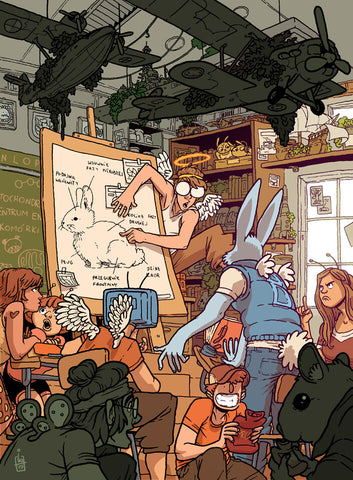
Debate Class © Igor Wolski
Here are some of the questions my players have asked during these Q&A sessions:
- Are any of the routes more secret?
- Are any of the routes safer?
- Is there a benefit to traveling at a fast pace? Or a slow pace?
- Are the roads patrolled by local authorities?
- Do all the locals say one route is the best way?
- Are the roads watched by bandits?
- Do orcs patrol the (DIRECTION) road?
- Does the (DIRECTION) route have fresh water?
- Are there taverns along the routes?
- Is (DIRECTION) road safe for horseback? Or a carriage?
- Are there allies along the (DIRECTION) route?
- Will the weather be good for our journey?
- Are there monsters along the routes?
- Will we be able to reliably hunt/gather from the wilderness?
A way to spice this up even further is to allow the players to role-play one question. Just assume the role of a merchant, local, official, etc. and pose a scene where the party asks follow-up questions.
"Wait... How Do I Design a Route?"
Two options: 1) design each route like you would a dungeon (credit: Dungeon Dudes) with many forks, puzzles, secrets, and threats. 2) Take a 5 minute break, use your general knowledge of the surrounding world, randomly roll what is along each route, and improv the rest!
BTW... We Have AWESOME Dice Perfect for Your Character!
Teleport to Our Dungeons and Dragons Dice Shop Now
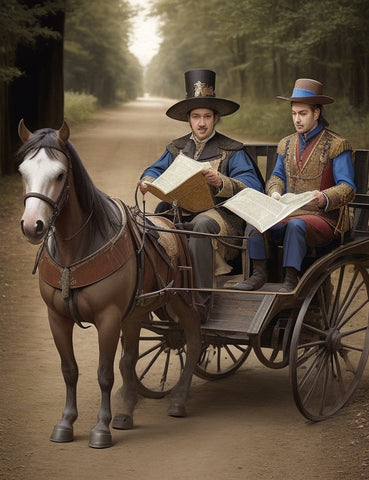
Awesome Dice Image
Mechanic 2: "Travel Jobs"
Confession time: when I first came up with this idea, I thought I had struck gold: I was in awe of my own brilliance.
Then about six months later I stumbled across Adventures in Middle Earth... and Campfire... and Dungeon Coach.
And... well... I felt a lot less special.
But while I was a bit embarrassed for thinking I was some sort of genius, I felt validated. Clearly, it is a good idea!
Here is how the "jobs" work:
-
Each player picks a unique job for their character for the journey/a day of the journey.
-
While traveling, any rolls relevant to that job are rolled by only that player.
-
Once the travel section/session ends, they no longer play their travel job.
-
New jobs are assigned the next day/time they travel.
This will help SPEED UP gameplay: no more waiting around as EVERY player rolls for everything!
It will also make downtime more FUN. When a DM asks "What are you doing as you travel?" ... players now have a framework that boosts creativity rather than open-ended-choice decision paralysis.
It will also add TENSION. I suggest DMs not allow players to perform the same job every single time... meaning, eventually, they will be responsible for a job that does not match their high skills/ability scores.
Here are the roles I allow my players to choose from:
- Vanguard: Scouts ahead, looking for signs of enemies or monsters (offensive).
- Rearguard: Responsible for making sure they are not ambushed (defensive).
- Navigator: Makes sure the party stays on course and doesn't get lost.
- Quartermaster: Manages and maintains all the supplies for the journey.
- Treasurer: Handles any spending for the party (split evenly).
- Hunter/Gatherer: Responsible for foraging, trapping, and shooting meals.
- Morale Officer: Keeps everyone's spirits up.
- Ambassador: Responsible for dealing with locals.
- Briber: Responsible for giving out a bribe to a soldier.
- Scholar: Researches the area they are moving through
- Smuggler: Responsible for dealing with criminals or avoiding authorities.
- (Rest): Does nothing. Recovers health and strength at twice the speed.
- Thief: Responsible for stealing any supplies they may need.
- Survivalist: Responsible for finding shelter, staying warm.
- Healer: Responsible for healing any wounds the party faces.
- Engineer: Builds with magic or material, whenever and whatever they need.
- (CAN CHOOSE TO SPEND MONEY INSTEAD FOR 3 SUCCESSES).
You can have players choose as many roles as you want or combine some of these if you want. But the way I do it, it is likely that your party will not be able to fill all the jobs... and that is by design! For one, not every journey requires every job. But also, it is another way you are presenting players with consequence-laden choices! Alternatively, you can randomly roll which player rolls for a job if a situation along the road requires it.
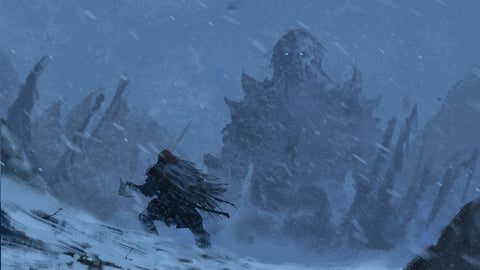
Mechanic 3: Survival Meter - Staving off the Elements and Exhaustion
The first two mechanics are primarily about giving the players more agency in travel gameplay. This mechanic is focused on weaving the missing ingredient of 5e travel—SURVIVAL—into our travel rules DnD 5e.
The Simple "Survival Meter":
-
Depending on their situation, the party starts at a number on the survival meter (ex: 6).
- This meter can be set for half days, days, long rest, weeks, or months.
-
Each time a player character fails one of their "travel job" checks, takes a significant amount of damage in combat, fails a survival check... or anything else the DM deems threatening to survival... the number goes down by 1.
-
Once they reach a lower number (ex: 3) the DM either selects or randomly rolls what goes wrong (the "something wrong" can be anything from lost supplies to spoiled food to frostbite to a wolf pack to a monster encounter).
-
The players then begin to role-play the encounter.
-
If they fail the encounter and do not raise their survival meter, they begin to take levels of exhaustion.
Indeed, there is a fun, extreme version of D&D where players are tasked with keeping track of every drop of water, every arrow fired, and every pound of mutton eaten. Where carrying capacity is taken deadly seriously and players spend the bulk of their gold on maintenance.
But the fact of the matter is: the vast majority of D&D players do not want to waste their previous free time on LOGISTICS... most campaigns do not benefit from tedious inventory. Adventurers only want to track rations and be foraging for food when their LIFE DEPENDS ON IT. And yet... supplies and survival go hand in hand... often, survival isn't something bad happening, but a mere lack of supplies!
And that's what makes this mechanic so great:
1. It gets rid of boring logistics (like rations and foraging)
2. It creates survival SCENES (dnd 5e travel ENCOUNTERS)
3. It introduces adventurers to the exhaustion mechanic more often
It assumes the player characters are ADVENTURERS who intuitively know how to prepare for a journey. The end result: players get to experience the anxiety, dread, thrill, and relief that comes with surviving an uncertain and treacherous journey. The conclusion is clear: skip logistics... focus on the high-stakes survival scenes these travel rules provide!

Changes to Make These Travel Rules DnD 5e Work
Like many homebrew rules, these travel rules DnD 5e work... for the most part. There are a few spells and rules that throw a wrench in it. This is no surprise: there are good reasons the exploration pillar is the forgotten pillar, and the classes and functions are focused on role-playing and warfare. Here are the top four things you maaaaaay need to ignore/adjust in order to make these mechanics work flawlessly:
Goodberry (1st Level Spell): Straight up ruins survival. Get rid of it. No, I am not going to explain myself, Zee Bashew did it for me (watch his classic Goodbery video here).
Rangers (5e Class): First of all... who still plays rangers?!? It is by far the most mocked class (deservedly) and is a clear, feeble attempt by WOTC to add more exploration. I think they are one reason everyone hates exploration; if a ranger is in the party, wilderness exploration is too easy.. and if they are not in the party, it is way too hard. I would DEFINITELY get rid of "Natural Explorer" and have players use the optional "Deft Explorer" rule. But if they INSIST on keeping their "Natural Explorer" class feature, make it so they CAN get lost, even if the ranger is in the Navigator travel role (if favored terrain, maybe give the ranger advantage on their roll).
Magical Food and Water (spells): These would include spells like "Create/Destroy Water" and "Purify Food and Drink"... and I am ambivalent on his. On the one hand, I want to reward players for selecting survival utility spells. On the other hand, some of the classes with access to them have access to ALL their spells after a long rest, so it really isn't a sacrifice. I would compromise: sustenance created via magic keeps you alive... FOR A TIME... but it is not a long-term solution. After 3 days of magical food, it starts to lose taste and stops being filling.
Long Rests: RAW, players can get a long rest for 8 hours of inactivity, which allows them to recover from exhaustion. I would suggest either extending that to 24 hours or requiring more time to long rest the longer they travel, or not allowing them to recover from exhaustion this way when they fail the survival meter.

Why These DnD 5e Travel Ideas Create GREAT Gameplay
**Together, these three mechanics preserve all the best things about travel (providing adventure, world building, etc.) while also getting rid of its most boring and repetitive aspects**
A) They Create DnD 5e Travel Encounters (ie SCENES)!!!
Unlike the combat and social pillars, the entire exploration pillar has a problem with scenes. So much so that we posted a whole blog about it (read it here). Without scenes, it is difficult for players and DMs to author the plot and there is no story space for the game to inhabit. Exploration is reduced to narration.
That problem is intensified for travel. In movies, travel is almost always a montage of scenes. For example, take the Fellowship leaving Rivendell in The Lord of the Rings: The Fellowship of the Ring:
- Montage of them walking... making camp... Saruman's crows find them...
- More montage... Boromir and the ring... storm at peak...
- Shots of broken Moria bridge... riddles in front of the door... attacked by the watcher in the water...
These mechanics naturally create the tense scenes and downtime moments that compose an RPG journey.
These travel rules DnD 5e take the exploration pillar out of the shadows by providing fun gameplay mechanics that allow it to function as an exciting scene. And without violating player agency: characters place THEMSELVES in these life-or-death situations based on the decisions THEY make and rolls THEY fail/succeed. Rather than some narration montage or meaningless random encounters, the players actually travel in a way that contributes to their character development and the plot of the story.

© Patricia Pria
B) They Create Cooperative Storytelling
I know I'm preaching to the choir... but players are not just actors... they are the fellow authors of your D&D adventure. To be an author, players need agency. They need to have the ability to make meaningful decisions that have all sorts of consequences. This is something that is not only unique to D&D, but also keeps players engaged.
When D&D is at its best and most magical, DMs, players, and dice all tell a story together. These travel mechanics include DMs creating a world, players making meaningful decisions, and then everyone holding their breath as dice are tossed into the air.
They also prevent DMs from railroading, players from over planning, and dice from totally screwing everyone with random, horrible rolls.
C) They Work With Any Travel Distance
No matter what distance you're traveling, these three mechanics will make it better. It all depends on your route design...
- If it's a day's journey through some forbidden forest, you could have a (potential) obstacle every HOUR (pg 106 DMG). And with no landmarks or line of sight, whoever has the Navigator travel job is probably going to get the party lost...
- If they are traveling along the King's Road to another province, you can design your route to have a (potential) obstacle every DAY. Heavily trafficked roads have taverns to rest at, but are also patrolled by bandits... the player with the Vanguard travel job better be proficient at perception checks...
- And if they are sailing across an ocean to the New World, you can design the voyage to have a (potential) obstacle every WEEK. And gosh, with some bad winds, they better hope the character with the Quartermaster travel job rolls high. Otherwise everyone might start getting cabin fever.

© Disney
D) They are SIMPLE for DMs and Players Alike
The survival meter is easier than an initiative tracker. The "travel jobs" are assigned to and used by the players. The route Q/A is straightforward and intuitive. And all can be fiddled with to meet any DM's personal taste.
No charts... no extended rules... no complex taking of inventory. Sure, route design comes with some difficulty, but no more than any other amount of design for a session.
Easy peasy, lemon squeezy.
Want A Guide for the Best Dnd 5e Travel?
Get Our Handy Summary PDF Here
It's the Most Important Points from Our 3 DnD 5e Travel Blogs
By Riley Rath - Freelance DnD Copywriter


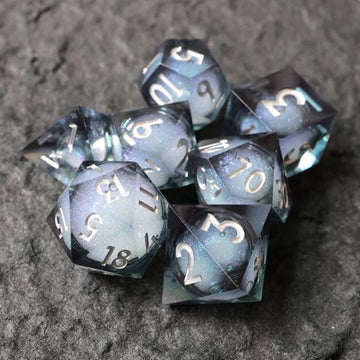


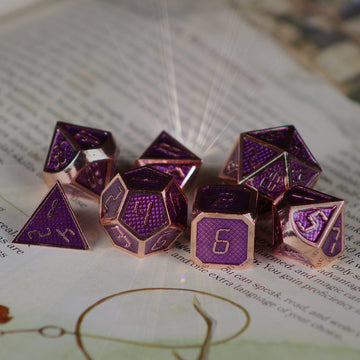

Just an overall comment regarding these awesome dice D&D blog posts… thank you for hosting these!! I’m really enjoying Riley’s posts, voice and thoughts on all the topics! Fantastic resource